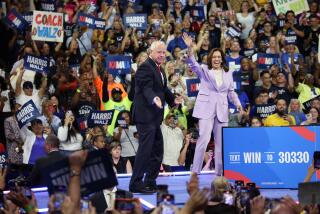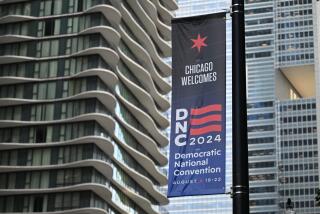Analysis: LeBron James may have gone, but GOP is arriving: Why Cleveland rocks
- Share via
All the little chicks with the crimson lips go / Cleveland rocks! Cleveland rocks! / Livin’ in sin with a safety pin goin’ / Cleveland rocks! Cleveland rocks!
OK, so that--the theme song from “The Drew Carey Show,” the nine-year ABC offering proudly set in Cleveland—is likely not the reason a Republican Party committee chose the Forest City for the party’s 2016 national convention.
Nor did the Tuesday announcement rest on Cleveland’s Dangerfield-esque reputation. To certain generations—that is, the generations that will populate the party’s convention—Cleveland stands for riots and default and the Cuyahoga River—a waterway—catching fire because of the polluted gunk that floated on its surface.
To others, Cleveland is the city that LeBron James left behind, in a wrenchingly public humiliation, to heighten his championship chances (and, having won in Miami, is presently shopping himself elsewhere, including spurned Cleveland).
Google “Cleveland reputation,” and this is what you get:
“Cleveland ranked 17th most miserable city; residents react.”
“Is Cleveland bad or is it just perception?”
Whatever the answer, that last word—perception—may get to the biggest draw the Ohio city had in securing the convention.
Truth be told, conventions are rarely moneymakers, despite the pledges of the city fathers; the need to stiff-arm other gatherings during weeks of preparations and extravagant policing costs tends to doom profits.
They also rarely make for political advantage. Look at 2012: President Obama won Florida, where Republicans had their convention, and Republican Mitt Romney won North Carolina, where Democrats had theirs. That is the norm. Most Americans—the shrinking number paying attention, anyway—observe conventions through the television screen, so they could be taking place down the street, across the country or on a sound stage somewhere, no matter.
All any convention city really needs is enough built-in infrastructure—swanky hotel facilities and a well-appointed convention center—to satisfy the needs of the party’s biggest donors and a willingness by city leaders to defer to the party’s demands, financial and otherwise.
The Republican finalists for 2016 were Cleveland and Dallas, home to the 1984 GOP convention, where mink-appointed cowboy hats mixed with over-the-top elephant-themed jewelry to usher in the second nomination of Ronald Reagan.
This time around, some suggested that the Dallas effort was doomed by the refusal of Dallas Mavericks owner Mark Cuban to move his team’s games if needed to accommodate the Republican National Convention.
But Texas also had some real perception problems. As Republican National Committee leader Reince Priebus is engaged in an effort to broaden the party’s appeal, particularly to women, minorities and the young, the Texas Republican Party has skedaddled to the right. Its most recent embrace: endorsing in a party platform the “legitimacy” of so-called reparative therapy, which some in the Christian conservative community that powers the state party believe can turn gays straight.
If that seems too small a hiccup to matter, consider that perception also appeared to have derailed the convention hopes of Las Vegas, particularly after a host of Christian conservatives complained to Priebus that the city was “a metaphor for all things decadent.”
So there sat Cleveland, ready and willing and, more than that, a municipal symbol of a demographic that has eluded the Republican Party to its peril: blue-collar, middle America. The type of voters who used to be so open to Republicans that they were termed “Reagan Democrats.”
And in Ohio, the linchpin to any successful presidential strategy, a state where a middlingly popular Democratic president thumped the Republican nominee in 2012, despite myriad GOP efforts. The region may have troubled cities, aging populations and less snazz than the booming South and Southwest, but Ohio and the rest of the upper Midwest have a death grip on presidential campaigns and don’t look to be letting go soon.
After the obligatory hurrahs about Cleveland’s hotels and venues and arenas, Priebus acknowledged the role that middle America would play in 2016, even as he ignored the almost inverse relationship between convention sites and election results.
“In the end, as well, it’s Cleveland, Ohio,” he said in an interview on Fox News Channel’s “Happening Now” program. “As goes Ohio, so goes the presidential race.”
For political news and analysis, follow me on Twitter: @cathleendecker
More to Read
Sign up for Essential California
The most important California stories and recommendations in your inbox every morning.
You may occasionally receive promotional content from the Los Angeles Times.














